Step into the timeless journey of church covenants in the Bible, where ancient promises meet modern faith.
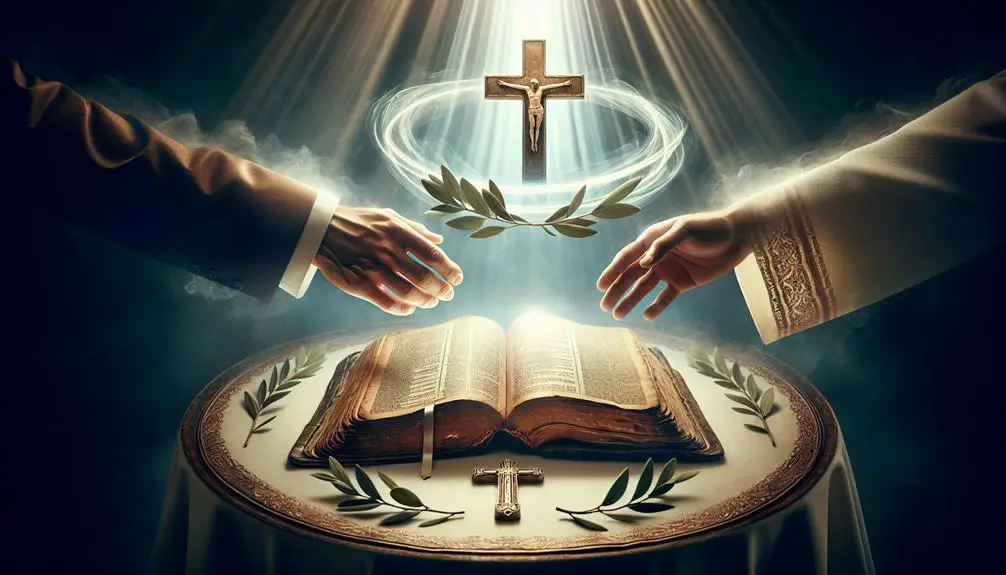
Church Covenant in the Bible
When you venture into the heart of biblical teachings, you might say you're entering a garden with ancient roots, where the concept of the church covenant quietly blossoms. This sacred agreement, woven through the tapestry of scripture, from the Old Testament's promises to the New Testament's fulfillment, isn't just historical footnotes. They're the blueprint for communal faith life, guiding principles that have shaped modern Christianity in ways you might find surprisingly relevant.
So, why should you care about these ancient contracts? They offer a unique lens through which to view your own spiritual commitments and how they align with a broader community's values. Let's explore this further, shall we?
Key Takeaways
- Biblical covenants are foundational, guiding theology, worship, and moral obligations in both the Old and New Testaments.
- The New Testament transforms covenant understanding, emphasizing faith, grace, and inclusivity over adherence to law and external rituals.
- Symbols and rituals in biblical covenants signify mutual commitment, from Noah's rainbow to circumcision and the transformative internal signs of the New Covenant.
- Church covenants today draw on biblical principles, emphasizing communal accountability, active participation, and nurturing spiritual bonds within the church community.
Origins of Biblical Covenants

To understand the foundations of biblical covenants, it's essential to delve into their historical and theological origins, tracing back to ancient Near Eastern traditions and the pivotal role they play within the narrative structure of the Bible. You'll find that covenant foundations aren't a novel concept exclusive to the biblical text but are deeply rooted in the ancient agreements of the Near East. These agreements, often between a superior and an inferior party, mirror the structure and essence of biblical covenants, providing a framework for understanding the divine-human relationship depicted in Scripture.
Ancient agreements, documented in various archaeological findings, exhibit formal, binding contracts that were integral to societal and relational dynamics. Similarly, biblical covenants establish a formal relationship between God and humanity, characterized by promises, stipulations, and signs. This resemblance isn't coincidental but reflects a broader cultural context in which the biblical narratives were crafted. By analyzing these ancient texts, you get a clearer picture of how covenants functioned not just as theological statements but as living, breathing agreements that shaped the moral and societal fabric of the communities involved.
Moreover, the covenant foundations in the Bible adopt and adapt these ancient practices to convey divine truths, emphasizing the uniqueness of God's relationship with His people. Unlike the often temporal and conditional ancient agreements, biblical covenants underscore a divine commitment that transcends time, highlighting themes of faithfulness, redemption, and divine sovereignty. This deep historical and theological exploration into the origins of biblical covenants reveals their significance as more than mere contracts; they're foundational to understanding the narrative and theological coherence of the Bible itself.
Covenant in the Old Testament
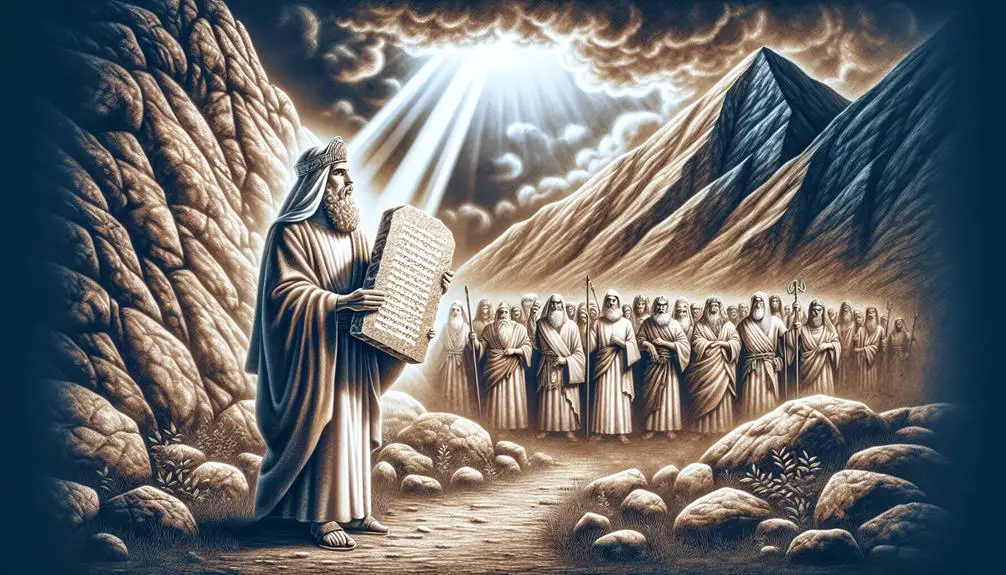
You'll find that the Old Testament frames covenants as foundational elements in the relationship between God and humanity. These agreements, detailed within scriptures, carry profound implications for theology, worship, and the moral obligations of the followers.
Analyzing the nature, key examples, and the symbolic significance of these covenants reveals their central role in guiding faith practice and belief systems.
Nature of Biblical Covenants
Biblical covenants, foundational to the Old Testament, represent solemn commitments between God and His people, characterized by specific promises and obligations. These covenants often include covenant conditions and divine promises, forming the bedrock of the relationship between the divine and the human.
- Covenant Conditions: Typically, these are obligations or commands that God's people are expected to fulfill. Compliance brings blessings, while failure leads to consequences.
- Divine Promises: God commits to certain actions or blessings in response to the fulfillment of the covenant conditions by His people.
- Mutual Agreement: Both parties, God and His people, agree to the terms, highlighting the covenant's reciprocal nature.
- Rituals and Signs: Often, these covenants are inaugurated or accompanied by specific rituals or signs, symbolizing the seriousness and permanence of the commitment.
Key Old Testament Covenants
Having explored the general nature of biblical covenants, let's now examine the specific agreements that underscore the Old Testament narrative. The Old Testament is rich with covenants that are foundational to understanding the relationship between God and humanity. These agreements often involved detailed covenant rituals that signified the solemn and binding nature of the commitments made.
Covenant |
Parties Involved |
Key Features |
|---|---|---|
Noahic |
God and Noah |
A promise never to destroy the earth by flood again; symbolized by the rainbow |
Abrahamic |
God and Abraham |
Land, descendants, and blessing; involved Abraham's journey and specific rituals |
Mosaic |
God and Israelites |
Law giving at Sinai, including moral, civil, and ceremonial laws |
These covenants set the stage for the unfolding narrative of redemption, each with unique stipulations and promises, deeply influencing the trajectory of Abraham's journey and the Israelite identity.
Covenant Significance and Symbols
Delving into the Old Testament, it's crucial to understand the significance and symbols of its covenants, which serve as cornerstones in the relationship between God and His people.
- Marital Allegories: These allegories illustrate the depth of commitment between God and Israel, portraying a union that demands fidelity and love, reflecting the sacred bond in marriage.
- Rainbows as Signs: The rainbow symbolizes God's promise to Noah, representing a universal covenant of peace and protection.
- Circumcision: Instituted with Abraham, this physical sign denotes a people set apart for God, embodying the covenant's exclusivity and perpetuity.
- International Implications: Covenants like those with Abraham had far-reaching implications, prefiguring a blessing to all nations and underscoring the global scope of God's redemptive plan.
New Testament and Covenant
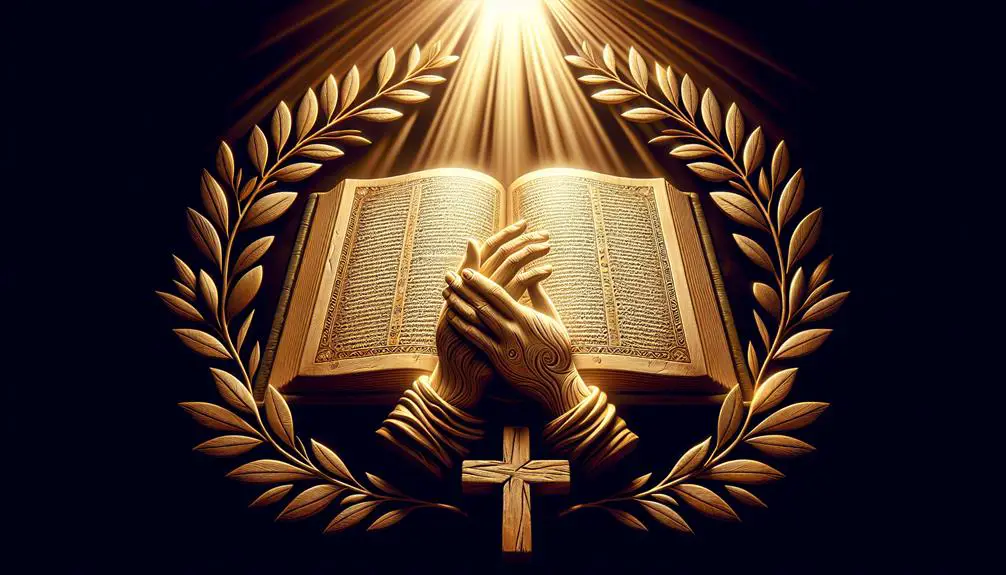
The New Testament introduces a transformative covenant, fundamentally redefining humanity's relationship with the divine through Christ's teachings and sacrifice. This covenant, unlike its predecessors, emphasizes faith and grace over strict adherence to law, marking a pivotal shift in theological understanding.
Central to this new covenant is the principle of Gentile inclusion. You'll find that the Apostolic teachings, particularly through Paul's letters, advocate vigorously for a covenant community that's inclusive of both Jews and Gentiles. This inclusivity isn't just a peripheral theme but a foundational aspect of the new covenant, underscoring the universal scope of Christ's salvation. Paul's epistle to the Ephesians (Ephesians 2:11-22) dismantles the dividing wall of hostility, proclaiming that through Christ, Gentiles are no longer foreigners but fellow citizens with God's people.
Moreover, the Apostolic teachings further elucidate the nature of this covenant as one established on the internal rather than the external. The emphasis shifts from external rituals to the internal transformation of the heart, a theme poignantly expressed in the epistle to the Hebrews. Here, the new covenant is described as one where laws are written on hearts, signifying a personal, internalized faith (Hebrews 8:10).
Through this lens, the New Testament's portrayal of the covenant is one of radical inclusivity and internal transformation. It's a covenant that doesn't just invite adherence but calls for a profound, personal engagement with the divine, facilitated by the teachings and sacrifice of Christ.
Symbols of Church Covenant

Building on the understanding of the new covenant's inclusivity and internal transformation, it's crucial to explore the tangible symbols that embody these principles within the church covenant. These symbols serve as physical representations of the spiritual commitments and formal agreements that bind the community together. They're not mere rituals; they're covenant rituals, deeply imbued with meaning and purpose. Here, we delve into four key symbols:
- Baptism: This initiatory rite symbolizes the believer's death to sin and rebirth into the life of the Spirit. It's a public declaration of faith and an entrance into the covenant community. Baptism acts as a vivid illustration of the believer's incorporation into the body of Christ.
- Communion: Also known as the Lord's Supper, communion commemorates Christ's sacrifice. It's a covenant ritual that reinforces the community's unity and their shared participation in Christ's body and blood. This ritual serves as a constant reminder of the new covenant's promises.
- Foot Washing: Although less common, foot washing serves as a powerful symbol of humility and service within the covenant community. It reflects Jesus' own actions and teachings on servanthood and love among believers.
- Covenant Renewal Ceremonies: These are formal agreements and gatherings where members reaffirm their commitment to the covenant and to each other. Such ceremonies can vary in form but are crucial for nurturing unity and reminding the community of their shared commitments and responsibilities.
These symbols, rich in theological and communal significance, anchor the church's covenant in both individual hearts and the collective experience, bridging the gap between belief and practice.
Living the Church Covenant
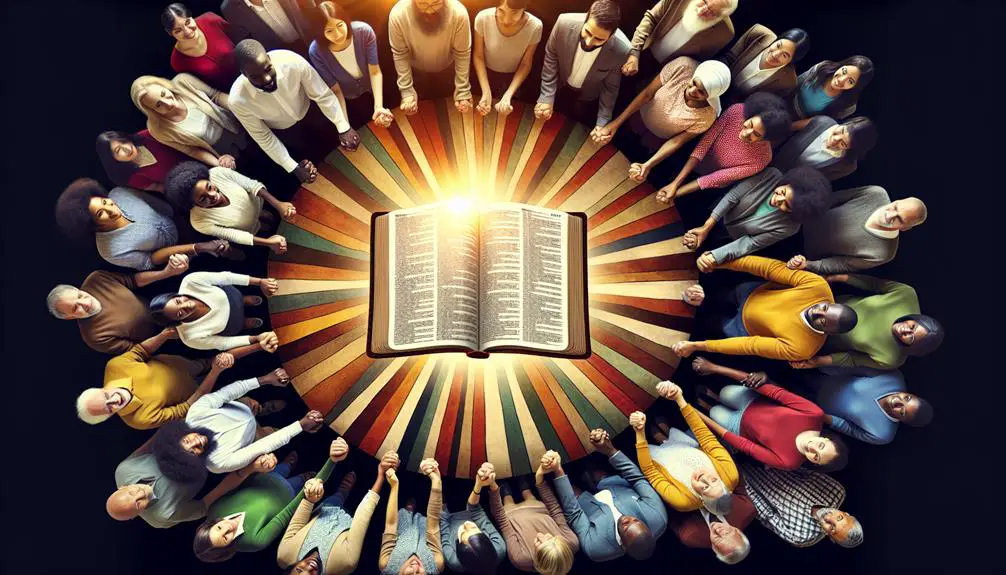
You need to grasp the essence of Church Covenant commitments, which serve as a spiritual framework guiding your daily life.
By applying biblical principles every day, you mold your actions and decisions to reflect the covenant's teachings.
Furthermore, nurturing spiritual community bonds strengthens the collective faith journey, emphasizing the covenant's role in fostering a supportive and engaged church environment.
Understanding Church Covenant Commitments
Living a church covenant involves actively committing to the shared beliefs and practices that define the community's spiritual life. This commitment isn't just a formality; it's a profound pledge to live in accordance with the covenant's principles, emphasizing the importance of membership vows and communal accountability. Here are four key aspects to understand:
- Membership Vows: You're not just joining a group; you're vowing to uphold its values and support its members.
- Communal Accountability: This means both giving and receiving guidance, encouragement, and sometimes correction, all in love.
- Active Participation: Being part of a church covenant calls for ongoing engagement in church life and ministries.
- Shared Beliefs and Practices: It's crucial to align with the church's doctrinal foundations and participate in communal worship and service.
Applying Biblical Principles Daily
Incorporating biblical principles into your daily life necessitates a deliberate and consistent effort to embody the virtues and commitments outlined in your church's covenant.
This journey towards spiritual growth involves refining personal habits and engaging in community service, two pillars that sustain your covenantal obligations.
Cultivating personal habits rooted in scripture—such as prayer, meditation, and study—fortifies your spiritual foundation, enabling you to navigate life's challenges with grace and resilience.
Concurrently, community service acts as an external manifestation of your internal transformation. It's a tangible expression of love and commitment to your neighbors, embodying the biblical mandate to serve others as an extension of your faith.
Thus, living the church covenant is an interplay between personal sanctification and communal engagement, each reinforcing the other.
Nurturing Spiritual Community Bonds
Nurturing spiritual community bonds within the church covenant demands an intentional commitment to fostering relationships that reflect and reinforce our shared faith values. This process acknowledges the significance of community diversity and spiritual practices in building a cohesive and supportive faith community.
To achieve this, consider the following:
- Embrace Community Diversity: Recognize and celebrate the diverse backgrounds and experiences within your community to foster a more inclusive environment.
- Engage in Collective Spiritual Practices: Regular participation in communal worship and prayer strengthens communal bonds and shared faith.
- Facilitate Open Dialogues: Encourage discussions that allow members to share their faith journeys, challenges, and insights.
- Promote Service and Outreach: Collaborate on service projects that align with your covenant's values, enhancing the sense of community through shared missions.
Impact on Modern Christianity

The influence of Bible church covenants on modern Christianity extends beyond mere tradition, fundamentally shaping contemporary faith practices and community dynamics. You'll observe that the roots of today's church governance and worship practices trace back to these covenants, reflecting a profound commitment to biblical principles and a communal approach to faith.
Here's a table that visually represents how church covenants impact modern Christianity:
Aspect of Modern Christianity |
Influence of Bible Church Covenants |
|---|---|
Church Governance |
Promotes a structure grounded in scriptural authority, emphasizing accountability and mutual support among members. |
Worship Practices |
Encourages worship that is both individual and collective, fostering a sense of unity and reverence based on covenantal principles. |
Community Engagement |
Inspires churches to actively engage with their communities, reflecting the covenantal call to serve and love one another. |
Spiritual Formation |
Guides individuals and communities in their spiritual growth, emphasizing covenant-based discipleship and mentoring. |
Theological Understanding |
Shapes a theological perspective that values covenant as central to understanding God's relationship with humanity. |
Analyzing the impact, you'll notice that church governance today often mirrors the covenantal emphasis on leadership accountable to both God and the congregation. This ensures decisions are made with a collective spirit and rooted in biblical truth. Similarly, worship practices have evolved to reflect covenant principles, balancing solemn reverence with communal celebration. This duality enriches the spiritual life of the community, fostering a deeper connection with both the divine and each other. In essence, the enduring legacy of Bible church covenants in modern Christianity is a testament to their foundational role in shaping how believers live out their faith together.
Frequently Asked Questions
How Do Different Christian Denominations Interpret and Implement the Concept of a Church Covenant Today, and What Controversies Have Arisen From These Interpretations?
Different Christian denominations interpret and implement the concept of a church covenant in varied ways, affecting denominational unity and how covenant enforcement unfolds.
You'll find that some groups prioritize strict adherence, sparking debates on inclusivity and governance, while others adopt a more flexible stance, fostering diversity but sometimes leading to ambiguity in practice.
These approaches have stirred controversies, particularly around how covenants align with broader Christian values and the autonomy of local congregations.
Can an Individual or a Family Create Their Own Personal Church Covenant Outside of an Established Church Community, and if So, What Might That Look Like?
Yes, you can create your own personal church covenant, focusing on covenant symbolism and personal devotion.
This might involve drafting a document that outlines your spiritual commitments and values, reflecting a deep personal connection to your faith.
This covenant could serve as a tangible reminder of your dedication, incorporating specific practices or principles that guide your daily life and spiritual journey, signifying a unique, individualized approach to embodying your beliefs.
How Do Church Covenants Address the Issue of Members Who May Struggle With or Openly Challenge the Doctrines and Practices Outlined in the Covenant?
When you encounter members challenging the doctrines, church covenants typically address this through member discipline and covenant renewal. This process involves a detailed examination of the member's grievances, providing a scholarly and analytical approach to resolve the conflict.
In What Ways Have Secular or Non-Religious Societal Values Influenced the Evolution or Adaptation of Church Covenants in Contemporary Christian Communities?
In today's melting pot, it's clear that cultural assimilation and legal influences have nudged church covenants towards adaptation.
You've seen how contemporary Christian communities are reevaluating traditional norms, integrating secular values to remain relevant and legally compliant.
This shift ensures that practices and doctrines resonate with broader societal changes, making faith communities more inclusive and reflective of the diverse world around them.
It's a delicate balancing act between tradition and evolution.
Are There Examples of Church Covenants Being Used as Instruments for Social Justice or Community Service Initiatives Within or Outside the Church Community, and How Are These Integrated Into the Covenant's Framework?
You're exploring how church covenants serve as tools for social justice and community service.
Historic precedents show these covenants often include commitments to societal betterment, integrating such aims into their framework.
Through covenant renewal, communities recommit to these goals, adapting to contemporary needs.
This process ensures the covenant remains a dynamic, living document, actively guiding the church's engagement in social justice and service both within and beyond its community.
Conclusion
In essence, you've journeyed through the rich tapestry of biblical covenants, from their Old Testament origins to their profound impact on modern Christianity. It's clear that these sacred agreements aren't mere historical footnotes; they're the heartbeat of faith communities, pulsating through time.
By embracing and living the church covenant, you're not just adhering to ancient traditions; you're participating in a divine symphony that harmonizes individual beliefs with collective spiritual commitment. This isn't just tradition—it's transformative.

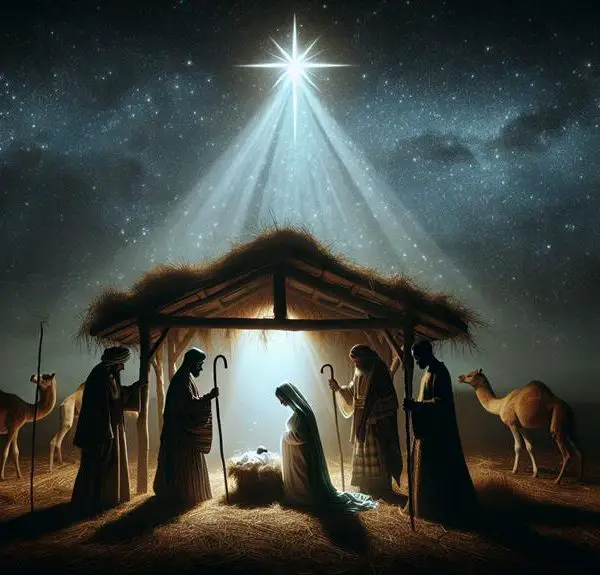

Sign up